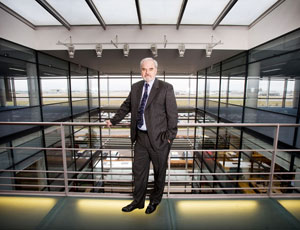Tall and bearded, Steven Morgan retains the bearing of a former U.S. Navy rear admiral, along with the conviction of who is in charge. As the new head of the $11-billion capital program of U.K. airport owner BAA plc, he sees himself not as a construction team member but as the boss of his suppliers.



“I have to be an intelligent customer, and I should be able to decide whether or not the contractor is meeting my expectations,” says Morgan, in his office at London’s Heathrow airport. “It’s no different from employing an employee...and let me tell you, a boss’s opinion is unilateral.”
Having been at the job since early this year, Morgan avoids directly criticizing BAA’s previous procurement strategy, which centered on integrated teams and framework agreements. Because BAA is widely considered to be a major innovator in construction practice within the U.K., Morgan’s new discipline has caused a stir.
“Steve is in the vanguard of...realizing you need the right sort of competition,” says Don Ward, chief executive of Constructing Excellence in the Built Environment (CEBE), an amalgamation of public- and private-sector bodies promoting good practice. “He wants to incentivize with pain-gain competition, and that’s something we’ve been advocating for 15 years.”
Morgan rejects the notion that successful management is “all about relationships.” What’s important is “for everybody to know precisely what they’re supposed to do,” he says. That means having well-written contracts and good incentives, he adds.
“I don’t want to be the project manager,” he says. “That’s my contractor’s responsibility. I don’t even allow my people to carry the title ‘project manager.’” In more than five years in the U.K., Morgan has noticed that “partnering and allowancing blurs roles.”
Until 2004, when Morgan went to the U.K. to become the commercial director at BNFL Ltd., his overseas procurement activities had been warlike. As a senior naval reserve officer, he had managed logistics for the U.S. military in the first Gulf war, as well as conflicts in Bosnia, Haiti and Panama, he recalls. He got into the “procurement business” after five years of active service in the 1970s, including submarine operations in Vietnam.
In civilian life, Morgan has been in shipbuilding and worked on solar and geothermal development with the U.S. Dept. of Energy. Among other positions, he was an executive in the nuclear business, becoming vice president for programs and capital projects with UNC Nuclear Industries at DOE’s Hanford site in Washington state.
With such a résumé, Morgan was a target for BNFL headhunters, drawing him to the Sellafield nuclear fuel facility in remote Cumbria in 2004. With wide-ranging responsibilities, his job was to help prepare Sellafield for transfer to private-sector management.
For his performance at Sellafield, Morgan was named Procurement Professional of the Year in 2008 by the U.K’s Chartered Institute of Purchasing and Supply. Among the achievements cited were an increase of competitive procurement from 18% to 92% of work and savings exceeding $300 million.
When URS’s Washington Division won a contract to run the site last year, Morgan left. “I [had] really intended to stay,” he says. “I hoped that there would be an opportunity to develop Sellafield...into a place where you’d make hydrogen and pump that all over the country.” He’s still lobbying for Cumbria to become the “Kuwait of the United Kingdom” by producing nuclear-powered hydrogen fuel.
But Morgan’s day job at BAA has taken him deep into the U.K.’s perennial debate on construction performance. In this business, BAA is “talismanic,” says CEBE’s Ward.
BAA’s status stems largely from work on construction performance led by John Egan, the firm’s chief executive...


Post a comment to this article
Report Abusive Comment